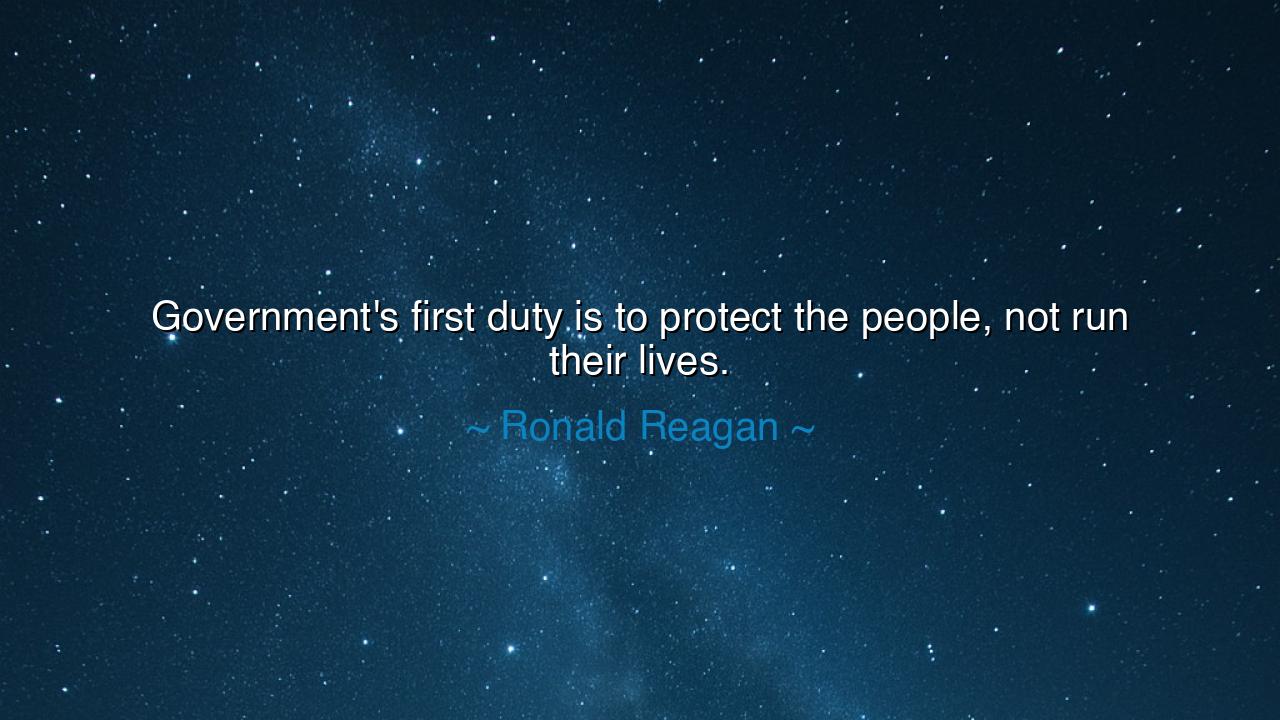
Government's first duty is to protect the people, not run their






In an age when faith in government was swelling, when men began to look to the state as both guardian and provider, Ronald Reagan — the man who carried the heart of a people yearning for freedom — spoke with the clarity of timeless truth: “Government’s first duty is to protect the people, not run their lives.” These words, simple and unadorned, echo the wisdom of the ancients and the courage of the founders. They are a reminder that the purpose of government is not dominion, but defense — not to shape the lives of free men, but to secure the peace in which they may shape their own. Reagan’s voice was one of restoration, calling his generation back to a principle as old as liberty itself: that freedom is the birthright of man, and protection its only rightful cost.
The origin of this quote lies in Reagan’s lifelong conviction that liberty and limited government are inseparable. Having lived through the Great Depression, through war, and through the rise of both tyranny abroad and bureaucracy at home, he had seen how power, once given to government in trust, rarely returns to the people in full. As President in the 1980s, he sought to revive the spirit of independence that had built the American republic — to remind citizens that the state is their servant, not their master. His words were a rebuke to the creeping paternalism of modern governance, the idea that government must manage every aspect of life — from economy to morality, from health to happiness. Reagan understood that when a people surrender their choices in exchange for comfort, they trade the dignity of freedom for the chains of dependence.
This truth has echoed across the centuries. In the ancient world, the philosopher Lao Tzu taught that the best rulers are those whose presence is scarcely felt, whose laws are few, and whose people govern themselves in harmony. Likewise, the Roman statesman Cicero declared that the safety of the people is the supreme law, but warned that when rulers overstep this purpose, they destroy the very liberty they were sworn to protect. And in every age, the same pattern has repeated: when governments forget their first duty — to protect, not control — freedom wanes, and tyranny takes its place. Reagan’s words, then, were not only American in spirit; they were universal in wisdom.
Consider the story of post-war Europe, when nations battered by destruction sought safety in new systems of welfare and regulation. What began as relief for the suffering soon grew into bureaucracy vast and unyielding. The state, once the protector, became the provider, and the citizens, once self-reliant, became dependents. Over time, the vigor of enterprise and personal responsibility faded, replaced by complacency and expectation. The shield had turned into a leash. Reagan, watching this from afar, resolved that his own nation would not walk the same path — that America would remember the ancient truth that security is the servant of liberty, not its master.
Yet Reagan’s vision was not one of anarchy or indifference. He did not call for the absence of government, but for its rightful place — strong where it must be, humble where it ought to be. The sword of the state must defend against enemies, both foreign and domestic; the law must restrain the hand of the violent and the corrupt. But beyond this sacred duty, government must step back and allow the human spirit to flourish. For the greatness of a people does not arise from mandates or ministries, but from the fire of their own courage, faith, and industry. A nation that entrusts its government with every care soon forgets how to care for itself.
The heart of Reagan’s wisdom lies in this: freedom and responsibility are two sides of the same coin. The people cannot remain free if they seek government to solve every problem; nor can government remain just if it forgets the boundaries of its power. The more it intrudes into the private lives of its citizens — regulating their choices, taxing their labor, dictating their morals — the more it erodes the very independence it claims to preserve. Thus, the purpose of government is not to create a perfect society, but to protect a free one — a society where men may strive, fail, and rise again by their own will.
The lesson of this quote endures for all generations. Let no citizen wait idly for the state to grant what he can build himself. Let no leader believe that compassion means control. A nation’s strength is measured not by how much it governs, but by how little it must — for only a virtuous and self-reliant people can sustain liberty. The duty of government is to defend the realm, to uphold justice, to preserve order — and then to stand aside, that its people may live freely under heaven’s gaze.
So let the words of Ronald Reagan be inscribed upon the hearts of the free: “Government’s first duty is to protect the people, not run their lives.” Let rulers hear them as warning, and citizens as reminder. For when the state forgets its purpose, the people lose their freedom; but when both stand in harmony — the government guarding from without, and the people governing from within — then the light of liberty burns bright and cannot be extinguished. Remember, then, that freedom is not a gift bestowed by government, but a responsibility carried by the governed. Protect it, live it, and pass it on — for in that sacred balance lies the destiny of all free nations.






AAdministratorAdministrator
Welcome, honored guests. Please leave a comment, we will respond soon